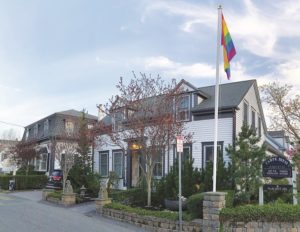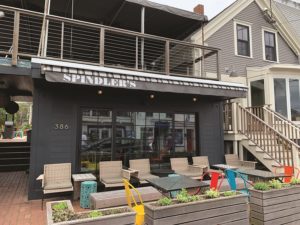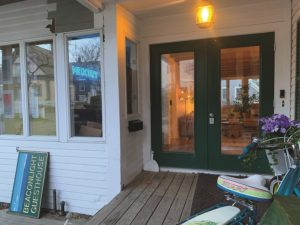PROVINCETOWN — The last eight months have seen rapid changes in Provincetown’s commercial sector, with major properties including the Crown & Anchor, the Governor Bradford, the Brass Key, Crowne Pointe, and Land’s End Inn all changing hands.
That trend continues, as recent sales and license transfers show that Sawyer Realty Partners of Newton have bought the Beaconlight Guest House and are in the process of buying the Carpe Diem Guest House, the Waterford Hotel, and Spindler’s restaurant.

The business licenses for Carpe Diem, at 12-14 Johnson St., and the Waterford and Spindler’s, at 386 Commercial St., were transferred from their prior owners to corporations owned by Sawyer Realty Partners at two licensing board meetings in April. The licensing board’s televised meetings are often the first time that news of a pending sale becomes public record.
The sale prices for Carpe Diem, the Waterford, and Spindler’s are not yet public. The sale of the Beaconlight at 12 Winthrop St. was officially recorded in February for $2.6 million.
Sawyer Realty Partners has two principals, David Rosenberg and his daughter Jessica Rosenberg. For three decades, the company has primarily invested in apartment buildings on the East Coast. According to its website, the company “bought and divested 137 communities comprised of over 45,000 units” since 1993. Its largest-ever transaction was a $1.4 billion deal in 2006 that took the Town and Country Trust, which owned 37 apartment buildings, off the New York Stock Exchange.

Jessica Rosenberg joined the company in 2018, after working in restaurants, a senior living company, and an investment bank. Sawyer Realty is diversifying into hotels and restaurants, according to its website, and Jessica is the asset manager for this new portfolio.
Sawyer Realty’s hotel and restaurant portfolio currently includes six restaurants in Newton, Brighton, Reading, Edgartown, and South Boston. There are also three hotels on Martha’s Vineyard: the Edgar, the Morgan, and the Franklin. The Franklin was redeveloped from a vacant residential property into an 18-room guest house, according to reporting in the Vineyard Gazette, and the company also owns nearby properties that are used for workforce housing.
Provincetown has only a few owners at this scale. Linchris Hotel Corp. owns the Surfside Hotel and the Harbor Hotel and recently purchased the Brass Key and Crowne Pointe in a $25-million deal. The Lexvest Group owns the Cape Colony Inn, the Breakwater Hotel, and several short-term rental properties in Truro and recently purchased the Prince of Whales in Truro and the Governor Bradford in Provincetown. Ben DeRuyter and Bruce MacGregor own the Whaler’s Wharf shopping arcade, the Art House, the Aquarium Mall, and Coastal Acres Campground. Sawyer Realty Partners will be joining a relatively small group of multiple commercial property owners here.
Provincetown represents a different kind of investment for her company, Rosenberg told the Independent.
“I’ve been going down to Provincetown since I was a kid,” Rosenberg said, “and I have a lot of very, very close friends that spend summers there. My father and I, we love the energy down there. My dad lives in Martha’s Vineyard, and it’s great, but it can be a little stuffy sometimes.

“Provincetown is such an open, amazing community, and we want to immerse ourselves in that community,” she said. The Mercury West Hotel, which is the new name for the former Beaconlight, will be hosting some of the Provincetown Business Guild’s out-of-town drag performers during Carnival week, she said.
“The LGBT community is one of our favorite things about this market,” Rosenberg added. “We are really happy to embrace every aspect of the community.”
Rosenberg also said that the hotels are structured differently from the apartment building side of the business.
“In the early 2000s, when we were working with huge institutional partners, we were buying and selling every day,” said Rosenberg. “The mentality is a lot different now. We really don’t sell anything anymore.
“For the hotels, we have some outside investors, but they’re mostly family and friends,” she added. “I would say 85 percent of this portfolio is privately held, either internally or family and friends. And we have 100 percent autonomy on how this portfolio is run. If our investors want out, we’ll buy them out. We love the market, and we consider these generational assets. Everything in the Vineyard that my father and I own, we would literally never sell it.”
Both the Gazette’s reporting and Sawyer Realty’s own website mention workforce housing as a company priority. Rosenberg confirmed this and said her father had just visited several properties in Provincetown looking for sites that could be redeveloped into workforce housing.
“I’ll keep it vague only because some stuff is on the market and some stuff isn’t, but we’re not necessarily talking about current housing,” said Rosenberg. “We’re talking about redevelopment of some sort of existing asset.
“We also have some 40B affordable projects in the pipeline on the South Shore,” she continued. “Those are usually like a 60-40 split, or an 80-20 split, between market-rate units and affordable units. It’s new for us, but we have three or four in process.”

These split projects are different from the large 100-percent affordable projects that are financed with federal tax credits, Rosenberg said. “Friends of ours do that — Winn Companies is one of the largest tax credit developers in the country — but we don’t have that knowledge and expertise. 40B projects are way easier to get your hands around.”
The workforce housing units on Martha’s Vineyard are not deed-restricted affordable, but they are designed and built to charge more modest rents, Rosenberg said.
“In the Vineyard, we bought the land correctly,” she said. “We know what we can build it for. And we know what rents we’re going to charge, to make it in the price range that locals can afford. We can make housing opportunities for the people who live there year-round, and not for people who want a pied-a-terre in Edgartown, and we can make money at those rents.
“If anyone is ever like, oh, this is a piece of land that we want to be developed — we’ll be the first one to come in and partner with you,” added Rosenberg. “We have capital. We have phenomenal builders. We’re looking for land, but maybe there are some opportunities we just don’t know about.”
